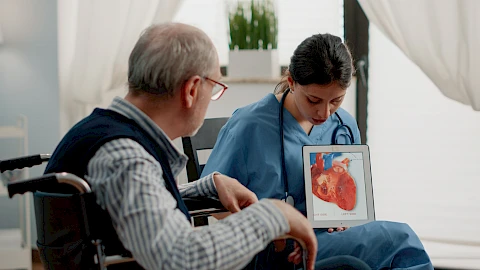
For seniors, monitoring cholesterol levels can be crucial to maintaining a healthy heart. Understanding how cholesterol affects heart disease risk is essential for seniors and their caregivers. This article will explore the connection between cholesterol levels and heart disease, emphasizing the importance of regular monitoring and management through lifestyle changes and medication when necessary.
What Is Cholesterol?
Cholesterol is a waxy substance found in your blood. It's needed for building healthy cells, but having too much can lead to health problems. There are two main types of cholesterol: LDL (low-density lipoprotein) and HDL (high-density lipoprotein).
LDL is often referred to as "bad" cholesterol because high levels can lead to plaque buildup in your arteries, increasing the risk of heart disease. However, HDL is known as "good" cholesterol because it helps remove LDL cholesterol from your arteries. Triglycerides, another type of fat in the blood, also affect your overall cholesterol levels and heart health.
Cholesterol and Heart Disease Risk in Seniors
Seniors are at a higher risk of heart disease for several reasons. As we age, our bodies undergo various changes that can affect our heart and blood vessels. High cholesterol levels can contribute to these changes, making it essential for seniors to pay close attention to their cholesterol levels.
Cholesterol can build up in the arteries, leading to a condition called atherosclerosis, which narrows and hardens the arteries. This can result in heart attacks, strokes, and other cardiovascular problems. Studies have shown that high cholesterol is a significant risk factor for heart disease in seniors, making it crucial to manage cholesterol levels effectively.
Why You Need Regular Monitoring
Regular monitoring of cholesterol levels is vital for seniors to detect potential problems early and manage them effectively. Seniors should have their cholesterol levels checked at least once a year. This can be done through blood tests at a healthcare provider's office or with home testing kits.
Seniors can take proactive steps to manage their heart health by monitoring cholesterol levels regularly. Early detection of high cholesterol can lead to timely interventions, reducing the risk of heart disease and related complications.
Managing Cholesterol Through Lifestyle Changes
One of the most effective ways to manage cholesterol levels is through lifestyle changes. Diet plays a significant role in maintaining healthy cholesterol levels.
Foods to Include:
- Fruits and vegetables
- Whole grains
- Lean proteins, such as chicken and fish
- Nuts and seeds
Foods to Avoid:
- Saturated fats (found in red meat and full-fat dairy products)
- Trans fats (often found in processed and fried foods)
Maintaining a healthy weight can further help manage cholesterol levels and reduce heart disease risk.
Medication and Medical Interventions
Sometimes, lifestyle changes alone may not be enough to manage cholesterol levels effectively. Medication can help control cholesterol levels and reduce heart disease risk when necessary.
Common medications prescribed for cholesterol management include statins, bile acid sequestrants, and cholesterol absorption inhibitors. Seniors must work closely with their healthcare providers to develop a personalized plan that suits their needs.
Senior Helpers Irving Can Provide Care for Seniors With High Cholesterol
Managing cholesterol is crucial for heart health, especially for seniors. Regular monitoring, lifestyle changes, and necessary medication can help reduce the risk of heart disease. Taking proactive steps to manage cholesterol levels can lead to a healthier, more fulfilling life. For seniors living in Irving, Dallas, or Grand Prairie, Senior Helpers Irving offers support and resources to help manage your health. Contact us today to learn more.